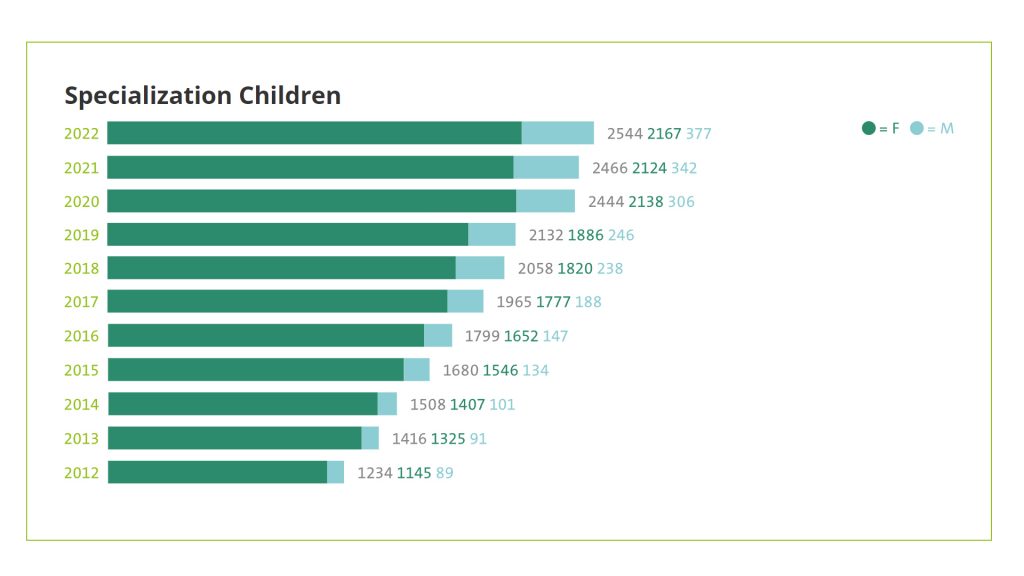Are you interested in helping children grow and thrive? If you’ve ever thought about a career in childcare, you’re not alone. In Switzerland, there is a high demand for dedicated childcare professionals, with over 800 vacancies listed on popular job search sites. However, the childcare industry has been facing some challenges recently. Is it still worth pursuing a career in childcare, and what does it take to succeed in this field?
We had the opportunity to interview Claudia Storni, a manager at Luna Kita in Pieterlen, about her role and the current state of the childcare industry in Switzerland. For both who are just starting or considering a career change, Claudia’s experiences and advice could provide the inspiration you’re looking for.
Is Pedagogical Education Necessary for Working in Childcare?

It’s not a straightforward answer at the moment. Technically, one must either complete a teacher training course or study pedagogy to work in childcare. However, the situation in this area has been quite challenging lately. According to a study by Kibesuisse, half of the employees have not yet completed pedagogical training.
In fact, due to the difficulties in hiring and retaining employees, the requirements for entering childcare institutions have been somewhat relaxed. If you are motivated to work in this field, then a career change or a different educational background will not be an obstacle. This is how Claudia actually started her journey in childcare! So, if you’re unsure about a career change or have been thinking about it for a while, maybe Claudia’s story will inspire you.
“What fascinated me was the development of children. That simply captivated me from the start, seeing children develop, and develop quickly, and what one can contribute as an adult to help them develop optimally. These questions were the most interesting to me.”
After initially pursuing an education in business, Claudia found her way into childcare. After three years of studying, she decided to make a change and chose childcare for two main reasons. She was interested in observing the process of child development and the significant role that adults play in it.
Starting with a regular apprenticeship after her business education, Claudia gradually advanced from working as a “Gruppenleiterin” (group leader) to a manager. When a management position opened up at her workplace, she initially took on the role temporarily but eventually accepted the position permanently after completing the required additional training. Today, she continues to work as a manager in childcare.
Challenges in Recruiting Childcare Professionals

The childcare sector has encountered significant challenges in the past five years. Initially, the pandemic led to a decrease in the number of children in daycare for safety reasons, which reduced the demand for childcare professionals. However, the demand for childcare services quickly surged, creating a significant shortage of workers.
Contributing factors to this shortage include relatively low wages and limited opportunities for professional development. As a result, one-third of childcare institutions were forced to operate at a loss, with many reducing the number of groups due to staff shortages or closing altogether.
Currently, there are more than 3,200 daycare facilities in Switzerland, including 300 private and 12 municipal Kitas in Zurich. According to Savoir Social 2022 statistics, 2544 individuals were trained in childcare, with women outnumbering men in these positions by a ratio of five to one.

Number of people trained in childcare between 2012 and 2022. Source: Savoir Social
The topic of men’s low involvement in childcare certainly deserves a separate discussion. However, despite the substantial number of individuals receiving training, retention within the industry remains a significant challenge. “We train many people, but many don’t stay,” notes Claudia Storni. “Many go on to further studies, which is good for their personal growth, but many also drop out during training. We’ve been wondering how we can retain the people we train in the industry.”
Recruiting new professionals is equally challenging. The pool of applicants is often limited, forcing daycare centers to make tough choices with only two or three candidates to consider. Fortunately, the Swiss government is gradually boosting support initiatives for childcare, with a recent study from Kibesuisse showing an increase in wages.
“The best teams are diverse, with people of different ages, backgrounds, and skills. Sometimes you can’t achieve that diversity, which is a challenge right now. It’s also difficult when looking for new staff because there isn’t much choice.”
Below we show the figures from the study, which take into account a 100% workload with 42 hours per week and 5 weeks of vacation.
| Position | Median Annual Salary (CHF) |
| Trained childcare specialist (FaBe) | 64,426 |
| Daycare center manager | 90,447 |
| Caregivers with tertiary education | 76,348 |
| Unskilled care staff | 56,509 |
Median Annual Salary in Kitas, Switzerland. Source: Kibesuisse
Innovative Strategies to Find New Recruits

At the time of writing, the most popular job search site for Kitas, Krippenstellen, had over 800 vacancies, which highlights the ongoing demand for childcare professionals. As a Kita manager, Claudia Storni has been proactive in addressing this challenge. “I’m trying to post more on LinkedIn, along with the classic methods like job platforms for daycare jobs or our website,” she says.
Claudia’s daycare has also started connecting with other Kitas. She notes that there can be no competitors in this area, especially when it comes to children.
“If I receive an unsolicited application and have no open position, I often ask if I can forward it to another Kita that operates similarly to us. This way, there’s no competition between daycares, and we support each other in finding good people.”
Claudia recognizes that the childcare industry has increasingly become like a business, requiring significant revenue to pay staff well. “I wish we could focus more on quality, maybe care for fewer children but with more trained staff, so they aren’t so stressed and can be more loving and attentive. If we have a group with eight babies and someone is sick, working with just two people is very challenging. More staff and more time for each child would be important,” she explains.
The Role of Work Culture
Work culture plays a crucial role in attracting and retaining staff in Kitas. “People care about having an open culture where they feel supported, where mistakes are allowed, and where the team helps each other out,” says Claudia. She emphasizes that a supportive culture is essential, especially for young people working in daycares. Open communication, where individuals can express themselves without causing harm, is vital for maintaining high-quality work for the children.
Empathy is another key quality in childcare. “Establishing a bond is crucial because children can grow best when they have a secure attachment to an adult,” Claudia explains. Forming and maintaining relationships are fundamental in this profession. Communication skills are also paramount. “You need to be able to express yourself in different ways and address difficult issues without hurting others, but still be direct,” she notes.
Join as an early bird to be the first to receive updates about our platform launch!
Communication skills are important within the team and with parents, understanding their perspectives and explaining why things might be different in daycare compared to home. Claudia believes it’s essential to be aware of different positions and always strive for the best possible solution for everyone involved.

Summary
The childcare industry in Switzerland is navigating through a period of significant challenges, from staff shortages and retention issues to financial struggles. Retaining trained professionals remains a significant challenge, with many leaving the industry for further studies or other reasons.
Claudia Storni, a seasoned Kita manager, shares her innovative strategies for recruiting new talent, including fostering connections with other daycares and emphasizing the importance of a supportive work culture. Her journey is proof that with dedication and a willingness to learn, a fulfilling career in childcare is within reach, even if you start from a different field.
If you love working with children and want to have a positive impact on their development, but you don’t know what to expect from the profession, check out the interview with Claudia Buntschu about the nuances of the profession.
FAQ
🎓 Is a Degree in Pedagogy Necessary for a Career in Childcare?
Ideally, a degree would be beneficial, but it is not always a strict requirement for a career in childcare. Due to staffing shortages and the high demand for childcare professionals, many Kitas have relaxed their entry requirements. Some institutions offer training in parallel with an internship. As long as you are motivated and willing to learn, you can transition into this field with the right training and dedication.
🔄 Can I Transition Into a Childcare Career From a Different Field?
Absolutely! Many people transition into childcare from various fields. Claudia Storni, for instance, started her career in business before moving into childcare. She is now a fully qualified Kita manager. The key is having a passion for working with children and a commitment to their development.
🧩 How Do Kitas Handle Staff Shortages?
The situation can be very different in each institution. Some institutions bring in help from other departments, others reduce the number of groups of children, while others are collaborating with other Kitas to share potential candidates. Many Kitas are open to hiring individuals from different educational backgrounds and providing the necessary training.
🌟 What Qualities Are Important for a Successful Career in Childcare?
According to Claudia Storni, a successful career in childcare requires empathy, strong communication skills, the ability to build relationships, flexibility, teamwork, and patience. These qualities help childcare professionals understand and support children and parents effectively, adapt to various situations, and collaborate well with colleagues.
